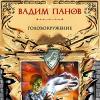Negative incentive exclamatory simple one-part sentence. Simple sentence. Types of simple sentences. Narrative, interrogative, incentive
Interrogative are sentences that are intended to encourage the interlocutor to express an idea that interests the speaker, i.e. their purpose is educational. For example: Why do you need to go to St. Petersburg?(P.); What will you tell yourself now to justify yourself?(P.).
The grammatical means of forming interrogative sentences are as follows:
1) interrogative intonation - raising the tone on a word with which the meaning of the question is associated, for example: Have you been to the Western Front?(Sim.) (Cf.: Have you been to the Western Front?; Have you been to the Western Front?);
2) word arrangement (usually the word with which the question is associated is placed at the beginning of the sentence), for example: Not Is the hostile city burning?(L.); But will he return soon with a rich tribute?(L.);
3) interrogative words - interrogative particles, adverbs, pronouns, for example: Not better Can you get behind them yourself?(P.); Is there really no woman in the world to whom you would like to leave something as a keepsake?(L.); Why are we standing here?(Ch.); Where does the glow come from?(L.); A what were you doing in my garden?(P.); What do you want me to do?(P.).
Interrogative sentences are divided into actual interrogative, interrogative-impellative and interrogative-rhetorical.
Actually, interrogative sentences contain a question that requires a mandatory answer. For example: Have you written your will?(L.); Tell me, does my uniform fit me well?(L.).
A peculiar variety of interrogative sentences, close to interrogative ones themselves, are those that, being addressed to the interlocutor, require only confirmation of what is stated in the question itself. Such sentences are called interrogative-affirmative: So are you going? (Bl.); So it's decided, Herman?(Bl.); So, to Moscow now?(Ch.).
Interrogative sentences can contain a negation of what is being asked; these are interrogative-negative sentences: What might you like here? It doesn't seem particularly pleasant(Bl.); And if he spoke... What new can he tell?(Bl.).
Interrogative-affirmative and interrogative-negative sentences can be combined into interrogative-narrative ones, since they have a transitional nature - from a question to a message.
Interrogative sentences contain an incentive to action expressed through a question. For example: So, maybe our wonderful poet will continue the interrupted reading?(Bl.); Shouldn't we talk about business first?(Ch.); - So will you give me Gogol? - asks Ivan Matveich(Ch.).
Interrogative rhetorical sentences contain an affirmation or a negation. These sentences do not require an answer, since it is contained in the question itself. Interrogative-rhetorical sentences are especially common in fiction, where they are one of the stylistic means of emotionally charged speech. For example: I wanted to give myself every right not to spare him if fate had mercy on me. Who has not made such conditions with his conscience?(L.); Desires... What good is it to wish in vain and forever?(L.); But who will penetrate into the depths of the seas and into the heart, where there is melancholy, but no passions?(L.).
Essentially, interrogative-rhetorical questions also include counter questions (answer in the form of a question): - Tell me, Stepan, did you marry for love? - asked Masha. - What kind of love do we have in our village?- Stepan answered and grinned.(Ch.).
Plug-in constructions can also take the form of an interrogative sentence, which also do not require an answer and serve only to attract the attention of the interlocutor, for example: The prosecutor flies headlong into the library and - can you imagine?- does not find either a similar number or the same date of the month of May in the Senate decisions(Fed.).
A question in an interrogative sentence may be accompanied by additional shades of a modal nature - uncertainty, doubt, distrust, surprise, etc. For example: How did you stop loving her?(L.); Don't you recognize me?(P.); And how could she let Kuragin do this?(L.T.).
Additional shades can be of an emotional nature, for example, a shade of negative expression: Are you deaf or what?; a shade of politeness (softening the question is usually achieved with the help of the particle not): Won't you come to me tomorrow? Wed: Will you come to me tomorrow?
Incentive sentences are those that express the will of the speaker; their purpose is to encourage action.
They can express: 1) an order, a request, a plea, for example: - Be silent!.. you! - Survivor exclaimed in an angry whisper, jumping to his feet.(M.G.); - Go, Peter! - the student commanded(M.G.); Uncle Grigory... bend your ear(M.G.); And you, my dear, don’t break it...(M.G.); 2.) advice, proposal, warning, protest, threat, for example: This Arina is an original woman; Please note, Nikolai Petrovich(M.G.); Pets of windy Fate, tyrants of the world! Tremble! And you, take heart and listen, rise up, fallen slaves!(P.); Look, my hands are washed more often - beware!(M.G.); 3) consent, permission, for example: Do as you wish; You can go wherever your eyes take you; 4) a call, an invitation to joint action, for example: Well, let's try with all our might to defeat the disease.(M.G.); My friend, let’s dedicate our souls to our homeland with wonderful impulses!(P.); 5) desire, for example: I would like to give him Dutch soot with rum (M. G.).
Many of these meanings of incentive sentences are not clearly differentiated (for example, plea and request, invitation and order, etc.), since this is expressed more often intonationally than structurally.
The grammatical means of forming incentive sentences are: 1) incentive intonation; 2) predicate in the form of the imperative mood; 3) special particles that add an incentive to the sentence ( come on, come on, come on, yeah, let it go).
Incentive sentences differ in the way they express the predicate.
Exclamatory sentences
exclamation marks These are sentences that are emotionally charged, which is conveyed by a special exclamatory intonation.
Different types of sentences can have an emotional connotation: narrative, interrogative, and incentive.
For example, declarative exclamatory words: He faced death face to face, as a fighter should in battle!(L.); interrogative-exclamation: Who would dare ask Ishmael about that?!(L.); exclamatory exclamations: - Oh, spare him!.. wait! - he exclaimed(L.).
The grammatical means of forming exclamatory sentences are as follows:
1) intonation, conveying a variety of feelings: joy, annoyance, grief, anger, surprise, etc. (exclamatory sentences are pronounced in a higher tone, highlighting the word that directly expresses the emotion), for example: Farewell letter of love, farewell!(P.); Appear, breathe delight and zeal to the regiments you left behind!(P.);
2) interjections, for example: Oh, this man always causes me terrible distress(Gr.); ...And, alas, my champagne triumphs over the power of her magnetic eyes!(L.); Wow!.. the food is good here! Ahti, good!(M.G.); Ugh, Lord, forgive me! Repeats the same thing five thousand times!(Gr.);
3) exclamatory particles of interjectional, pronominal and adverbial origin, giving the expression an emotional connotation: well, oh, well, where, how, what, what etc., for example: What a neck! What eyes!(Kr.); Well, here's some fun for you!(Gr.); How cute! (Gr.); That's what Kyiv is all about! What a land!(P.); How beautiful, how fresh the roses were!(T.); Wow, what are you! Don't say a word to her!(M.G.).
Common and non-common offers
(B. Pol.); At noon Razmetnov came home for lunch and through the gate door he saw pigeons near the threshold of the hut(Shol.); In every spiritually developed person the outlines of his Motherland are repeated and live.(Spread).
A sentence can be extended by compatible, controlled and adjacent word forms (according to the rules of verb connections), included in the sentence through phrases, or by word forms related to the entire sentence as a whole. Wed: The lacquered green of the poplars glittered(Past.); One day in August, at noon, the knives and plates on the terrace turned green, and dusk fell on the flower garden.(Past.). In the first sentence, the word forms varnish and poplars, being definitions, are simultaneously included in phrases ( lacquer greens, poplar greens); in the second - components one afternoon in August- characterize the entire predicative basis of the sentence ( knives and plates turned green). Distributors of a proposal are generally called determinants. As a rule, various circumstances and additions that express a semantic subject or object are determinative: Winter on Tverskoy Boulevard one of the sisters settled(Past.); There were a lot of snakes in the park(Past.); At the beginning of August ours moved from Bavaria to Italy(Past.); Katyusha had a lot to do around the house(L. T.); The chief conductor liked the carriage, and he visited it every now and then(Past.); Blok had everything that makes a great poet(Past.).
Thus, sentence propagators can be included in the predicative stem of a sentence, distributing either the composition of the subject or the composition of the predicate, or be proliferators of the stem as a whole. The term “determinant” was introduced by N.Yu. Shvedova.
A simple sentence is one that consists of one or more grammatically combined words that express a complete thought. This is the basic grammatical unit of syntax. A simple sentence must have only one grammatical basis (predicative center).
- Father washes the car.
- Children play on the lawn.
- Twilight.
- Grandma is resting.
A simple sentence is the main structural type of sentences in the Russian language, which is used to construct complex sentences.
- Spring has come + The snow has melted = Spring has come, the snow has melted.
Grammatical structure
There are main and minor members of a simple sentence. The main ones are the subject (answers the questions “who? what?”) and the predicate (answers the questions “what is he doing? what did he do? what will he do?”) - name the object that is the subject of the action (subject) and the action itself performed by the subject (predicate). The subject and predicate are interconnected and constitute the predicative center.
The secondary ones - addition, definition, circumstance - explain the predicate and/or subject or other minor members and depend on them syntactically.
- An old tram was moving slowly along hot rails.
In this sentence the subject is “tram” and the predicate is “rode”. The definition of “old” depends on the subject “tram”. The predicate “drove,” which is connected with the subject “tram,” governs the object “on the rails” and has the dependent adverbial “slowly.” The complement, in turn, also has a secondary dependent member of the sentence - the definition of “hot”. The entire sentence is divided into a subject group ("an old tram") and a predicate group ("drove slowly on hot rails"). The information below will help you parse sentences quickly and easily.
What are the types of simple sentences?
The following types of simple sentences exist:
- non-exclamatory and exclamatory (relative to intonation);
- narrative, interrogative, incentive (relative to the purpose of the statement);
- two-part and one-part (relative to the composition of the grammatical basis);
- complete and incomplete (regarding the presence/absence of the necessary members of the sentence);
- common and non-widespread (relative to the presence/absence of minor members of the sentence);
- complicated and uncomplicated.

Exclamation and non-exclamation
As for this type, the defining moment is the presence/absence of an exclamation mark.
- Spring came. Spring came!
Narrative, interrogative, incentive
The second type indicates the purpose for which this maxim is pronounced: to tell about something (the Danube flows into the Black Sea), to ask about something (When will you finally get married?) or to encourage something (Buy a loaf of bread at dinner).
One-piece and two-piece
What simple sentences can be called one-part sentences? Those whose predicative (grammatical) basis consists only of the subject or only of the predicate.
- Thaw.
- Beautiful girl.
- It's getting light.
If, of the main members of a sentence, there is only a subject, then such grammatical units are called denominative, or nominative.
- The beauty is incredible!
- Evening Kyiv with many lights.

If there is only a predicate, then there are several types of such one-part sentences:
- definitely personal (the action is performed by a certain object or person and is expressed by a verb in the form of the 1st and 2nd person singular or plural present or future tense);
- indefinite personal (the predicate is expressed by a verb in the 3rd person plural);
- generalized-personal (the verb is expressed in the form of the 2nd person singular of the present or future tense and the 3rd person plural, but attention is concentrated on the action itself);
- impersonal (the character is not grammatically expressed).
A sentence whose predicative center consists of two members is called two-part.
- It's raining.

Complete and incomplete
A simple sentence can be complete or incomplete.
A sentence is considered complete if it contains all the main and minor members necessary for the construction and completeness of the expression of the meaning.
- I look at the moon.
- The train passes the bridge.
In incomplete, the main or minor member of the sentence is missing, but it is clear from the context or situation of speech.
- She greeted the teacher. He is with her.
The word “hello” is missing here, but it is clear to the listener based on the context.
Common and non-common
A simple sentence can be widespread (there are minor members that serve to explain the main ones) and non-common (consists only of a predicative center, there are no minor members). Examples of common sentences:
- The July sun is shining brightly.
- Finally the weather cleared up.
- Beautiful slender girl.
Examples of uncommon sentences:
- The sun is shining.
- The weather has cleared up.
- Young woman.

Simple sentences can be complicated:
- the homogeneity of different parts of the sentence (He loved tremulous sunrises, colorful sunsets, and moonlit nights);
- separate definitions that stand after the word that is being explained (The road leading to the waterfall began to twist rapidly);
- applications (Near the forest there was a hut - the forester’s dwelling);
- separate additions (I really liked the film, with the exception of some scenes);
- isolated circumstances (Having prepared dinner, the mother sat in the kitchen for a long time);
- appeals and introductory constructions (Oh youth, how quickly you pass! Spring, it seems, will be late);
- with clarifying sentences (The accident happened at four in the morning, that is, at dawn).
But a simple complicated sentence is easy to confuse with a complex one. Therefore, you need to be careful and focus on the number of predicative centers.
Parsing a sentence is easy. You can write a hint diagram for yourself.
Depending on the purpose of the statement, sentences are distinguished: narrative, interrogative and incentive. These sentences do not require an answer, since it is contained in the question itself. In terms of intonation, the first sentence is non-exclamatory, and the second is exclamatory, expressing joy. 2. Based on the presence or absence of the main and minor members of the proposal, common and non-common sentences are distinguished.
Interrogative sentences are those whose purpose is to encourage the interlocutor to express an idea that interests the speaker, i.e. their purpose is educational. Actually, interrogative sentences contain a question that requires a mandatory answer. For example: Have you written your will? Interrogative sentences can contain a negation of what is being asked; these are interrogative-negative sentences: What might you like here?
Using three exclamation marks
Interrogative-affirmative and interrogative-negative sentences can be combined into interrogative-narrative ones, since they have a transitional nature - from a question to a message. Interrogative sentences contain an incentive to action expressed through a question. Interrogative rhetorical sentences contain an affirmation or a negation.
L.); But who will penetrate into the depths of the seas and into the heart, where there is melancholy, but no passions? Essentially, interrogative-rhetorical questions also include counter questions (answer in the form of a question): - Tell me, Stepan, did you marry for love? - asked Masha. - What kind of love do we have in our village? A question in an interrogative sentence may be accompanied by additional shades of a modal nature - uncertainty, doubt, distrust, surprise, etc. For example: How, did you stop loving her?

P.); And how could she let Kuragin do this? The predicate in an incentive sentence can be an infinitive, for example: Call Bertrand (Bl.); Don't you dare annoy me! In colloquial speech, incentive sentences are often used without verbal expression of the predicate - a verb in the form of an imperative mood, clear from the context or situation. These are peculiar forms of sentences in living speech with a leading word - a noun, adverb or infinitive.

Exclamatory sentences are sentences that are emotionally charged, which is conveyed by a special exclamatory intonation. Uncommon is a sentence that has only the positions of the main members - subject and predicate, for example: Several years have passed (P.); It was noon (Shol.); It began to get light (Prishv.); Silence.

Sentences that, along with the main ones, have positions of secondary members are called common, for example: Meanwhile, the sun rose quite high. Distributors of a proposal are generally called determinants. Non-exclamatory sentences are those that imply an ordinary, everyday tone and the absence of a strong emotional component. Exclamatory sentences are those sentences that convey strong feelings and emotions of the speaker.

Exclamatory particles of pronominal, adverbial or interjectional origin, giving the statement a characteristic emotional coloring: oh, well, well, how, where how, what for, which and others. Typically, by using 3 exclamation marks at the end of a sentence, the author expresses a high degree of emotional excitement. Sentences “Get out!!!” or “Go away and don’t come back!!!” talk about the deep feelings of the person who expresses them.

This video tutorial can only be viewed by registered users
Interrogative sentences contain a question. The purpose of an interrogative sentence is to communicate that the speaker wants to find out something from the listener, to find out something. By asking a question, the speaker hopes to receive an answer, which is why interrogative sentences are often found in dialogues. Interrogative sentences are divided into general interrogative and private interrogative.
Declarative, interrogative and incentive sentences can be pronounced with different intonation
Incentive sentences contain an incentive, command, request, call, advice to do something addressed to the listener. The purpose of an incentive sentence is to influence the interlocutor, to force him to do something.
The role of the predicate in an incentive sentence is often played by a verb in the form of an imperative mood: Let me die in peace in my beloved homeland, loving everything! S.A. Yesenin). However, in the Russian language there are many other ways of formally expressing will: particles, subjunctive mood of the verb, modal verbs, intonation, etc.
Sentences of all communicative types can be used as exclamatory sentences: narrative, imperative and interrogative.
Sentences in which we want to tell something, narrate about something - these are narrative sentences. Let's find a sentence in which the son asks his mother, encourages him to do something. This is an incentive offer. Wake up - help to wake up (hence the word alarm clock), and therefore begin to act; Inducement is a push to action, which is why they called the proposals incentive.
Sentences vary not only in why and for what purpose we speak, but also in how we do it: calmly or with a special feeling. Sentences in which feelings are noticeably expressed (joy, delight, fear, surprise, grief, annoyance) are pronounced with an exclamatory intonation.
Narrative sentences are sentences that contain a message about some fact of reality, phenomenon, event, etc. Incentive sentences are those that express the will of the speaker. Make up declarative, interrogative and incentive sentences from the words.



















